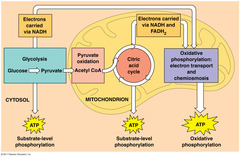| 7781832811 | Cellular Respiration | The process by which cells produce energy (ATP) C6H12O6 + 6O2 --> 6 CO2 + 6H2O + energy (oxidative process) |  | 0 |
| 7781832812 | ATP | Consists of adenosine plus 3 phosphates; source of immediate energy (know this structure) |  | 1 |
| 7781832813 | Glycolysis | Anaerobic phase of cellular respiration that breaks down glucose into 2 molecules of pyruvate - Occurs in cytoplasm - Makes 2 Net ATP molecules and 2 molecules of NADH | 2 | |
| 7781832814 | Fermentation | A process that produces a small amount of energy in the absence of oxygen - Begins with glycolysis and produces 2 molecules of pyruvate and then alcohol or lactic acid - Converts NADH to NAD+ by transferring electrons to pyruvate | 3 | |
| 7781832815 | Aerobic Respiration | Consists of Krebs cycle and electron transport chain (ETC) and oxidative phosphorylation - Requires oxygen - Occurs after the anaerobic respiration - Produces 34 ATP - Occurs in the mitochondria |  | 4 |
| 7781832816 | Citric Acid Cycle | Synonym for Krebs Cycle | 5 | |
| 7781832817 | Anaerobic Respiration | Synonym for fermentation | 6 | |
| 7781832818 | Aerobic | With oxygen | 7 | |
| 7781832819 | Anaerobic | Without oxygen |  | 8 |
| 7781832820 | Krebs cycle | Uses 2 acetyl co-A to produces 6 NADH, 2 FADH2, and 2 ATP and CO2 as waste - Occurs in the mitochondrial inner matrix - Part of aerobic respiration - Turns twice for each molecule of glucose (also known as Citric Acid Cycle) | 9 | |
| 7781832821 | Acetyl co-A | coenzyme combined with pyruvate created in middle step; raw material of Krebs cycle | 10 | |
| 7781832822 | ATP synthase | An enzyme that produces ATP as protons (H+) flow down a gradient through chemiosmosis or oxidative phosphorylation |  | 11 |
| 7781832823 | Electron Transport Chain | Energy-coupling reaction that creates H+ gradient in the membrane necessary for the production of ATP through chemiosmosis or oxidative phosphorylation - Energy released from the exergonic flow of electrons is used to pump protons across the membrane to create a proton gradient - Electrons flow down the chain from one carrier molecule to the next in a series of redox reactions - The final hydrogen (H+) acceptor in the chain is oxygen (H2+1/2O2 --> H2O) / Water is the waste product and is exhaled |  | 12 |
| 7781832824 | Oxygen | Final electron acceptor in the ETC | 13 | |
| 7781832825 | Water | Waste product created by at the end of the ETC | 14 | |
| 7781832826 | Chemiosmosis | A process by which ATP is formed as protons flow down a proton gradient through the ATP synthase complex (chemical + ...) |  | 15 |
| 7781832827 | Substrate-Level Phosphorylation | Process that produces a small amount of ATP during glycolysis and the Krebs cycle During this process, the enzyme kinase transfers a phosphate from a susbtrate directly to ADP, forming ATP |  | 16 |
| 7781832828 | Oxidative Phosphorylation | The production of ATP using energy from the electron transport chain. Ends with the production of water. |  | 17 |
| 7781832829 | NADH | Primary electron transporter to the ETC from glycolysis and Krebs cycle | 18 | |
| 7781832830 | FADH2 | Secondary electron transporter to the ETC from Krebs cycle, entering at lower energy levels than NADH | 19 | |
| 7781832831 | NAD+ | Oxidized form of NADH | 20 | |
| 7781832832 | FAD | Oxidized form of FADH2 | 21 | |
| 7781832833 | Redox Reactions | Reduction and oxidation |  | 22 |
| 7781832834 | Reduction | gain of electrons; gain of hydrogen -> for storing energy |  | 23 |
| 7781832835 | Oxidation | loss of electrons; loss of hydrogen -> for releasing energy |  | 24 |
| 7781832836 | Cytochromes | Proteins that help make up the ETC; transport electrons |  | 25 |
| 7781832837 | Inner-membrane space | Mitochondrial part where the ETC pumps protons |  | 26 |
| 7781832838 | Matrix | Site of Krebs cycle in mitochondria |  | 27 |
| 7781832839 | Cristae membrane | site of ETC and ATP synthase complex - contains thousands of copies of the ETC - impermeable to protons (H+) - folds of the mitochondrial inner membrane |  | 28 |
Cell Respiration - AP Biology Flashcards
Primary tabs
Need Help?
We hope your visit has been a productive one. If you're having any problems, or would like to give some feedback, we'd love to hear from you.
For general help, questions, and suggestions, try our dedicated support forums.
If you need to contact the Course-Notes.Org web experience team, please use our contact form.
Need Notes?
While we strive to provide the most comprehensive notes for as many high school textbooks as possible, there are certainly going to be some that we miss. Drop us a note and let us know which textbooks you need. Be sure to include which edition of the textbook you are using! If we see enough demand, we'll do whatever we can to get those notes up on the site for you!

